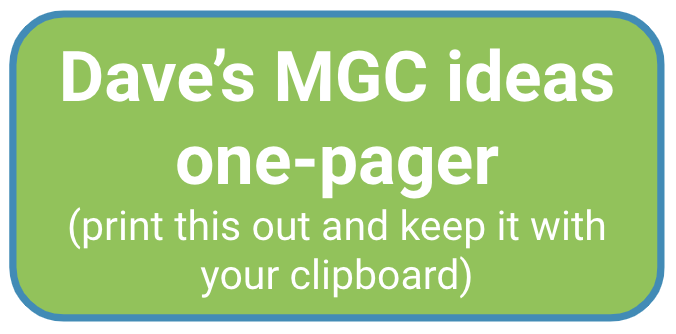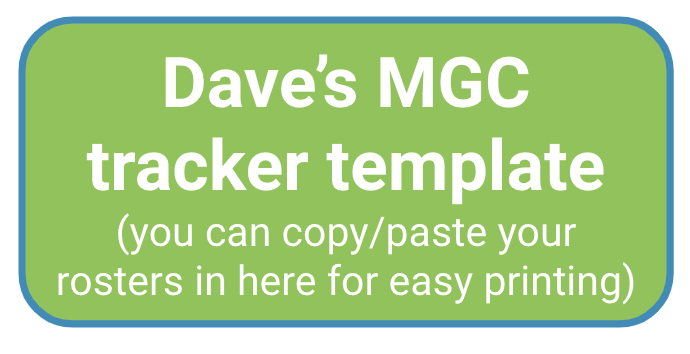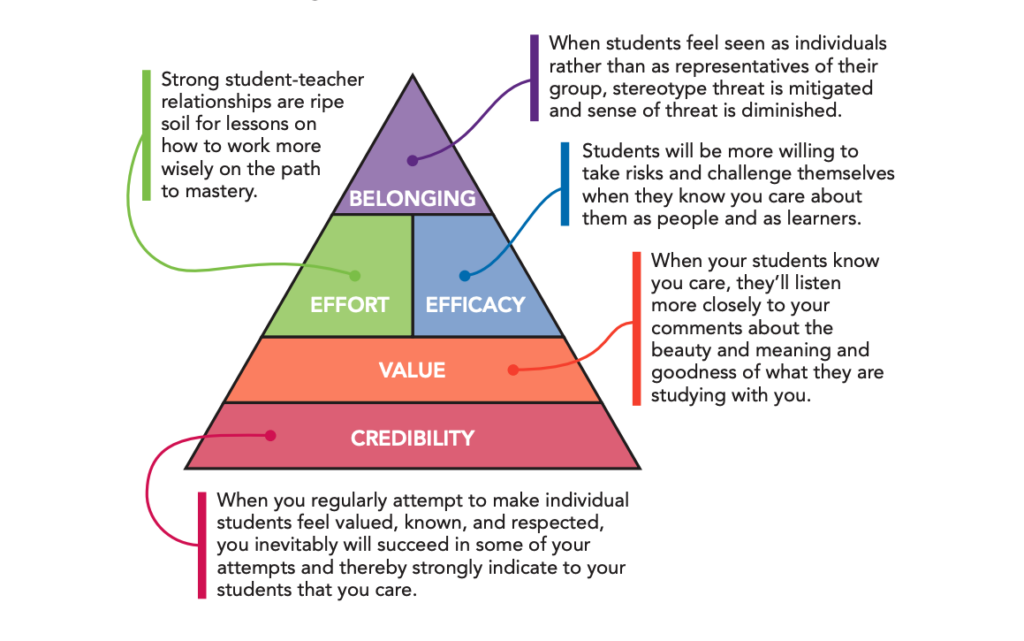In The Will to Learn: How to Cultivate Student Motivation Without Losing Your Own, I lay out an approach to student motivation in which Five Key Beliefs can be influenced using just 10 basic strategies.
The first of those strategies is Tracking Attempted Moments of Genuine Connection.
- What is it?
- How does this strategy influence the Five Key Beliefs?
- Common Questions and Hang-Ups About Tracking Attempted Moments of Genuine Connection (MGCs)
- How frequently should I do these?
- Don't these get exhausting?
- What should I write on the printed roster?
- Do you have a printable roster template that I can copy/paste my students' names into?
- What are examples of what an MGC attempt looks like?
- What do you mean, specifically, by signaling to a student that I value, know, and respect them?
- What if my MGC attempts are awkward?
- What if I don't currently have a good relationship with a student? Or, what if I just don't like them?
- What if I did an MGC attempt with a student but it didn't work?
- What if I can't think of what to say to my students?
What is it?
- A moment of genuine connection (MGC) is simple: 30 to 60 seconds in which I, as the teacher, attempt to communicate to a student that I value, know, and/or respect them.
- Moment: It can have its effect even if it is very brief — just 30 to 60 seconds.
- Genuine: I need to genuinely value, know, and respect the student in order for this to work. I also try to make it as private as I can, so I seek to do these one-on-one either as students are entering class, during independent work portions of class, or as students are leaving. To help with privacy, I tend to pull them aside within the room or just into the hallway.
- Connection: It's me trying to indicate to them that I VALUE them, KNOW them, and RESPECT them, as both learners and people.
- Because I cannot guarantee that a student will feel valued, known, or respected, I use the word “attempted.” It is not within my power to guarantee results. It is my job to attempt the connection.
- Because I cannot possibly mentally keep track of attempting MGCs with 100+ students each semester, I keep track of these on a printed out roster that I keep on a clipboard.
That's it — Tracking. Attempted. Moments. Of Genuine. Connection.


How does this strategy influence the Five Key Beliefs?
While Tracking Attempted MGCs is found in the Credibility chapter of The Will to Learn, it has an influence on every one of the Five Key Beliefs.

Common Questions and Hang-Ups About Tracking Attempted Moments of Genuine Connection (MGCs)
How frequently should I do these?
At a minimum, I seek to attempt an MGC with every student I teach at least once per month. To help with this, at the start of each month, I write the month at the top of the printed roster, and I review the previous month's tracker sheet.
Don't these get exhausting?
They certainly can, especially for introverted folks like myself. Here's a short article I wrote about that.
What should I write on the printed roster?
At a minimum, I put a check mark next to a student's name when I attempt an MGC. Often times, I may write a few words to indicate what I did with the student.
Do you have a printable roster template that I can copy/paste my students' names into?
Sure do. You'll find that in this brief article.
What are examples of what an MGC attempt looks like?
Here are some real-life examples from my classroom:

Notice that I tend to think of these in two categories: connecting with the student as a PERSON and connecting with them as a LEARNER. In order to optimize the degree to which my students find me Credible, I need to connect with them in both of these ways. If I only connect with them as a person, they may come to believe that I'm a caring person but not a capable teacher. If I only connect with them as a learner, they may come to believe that I only care about their work in my class and not about them as a person overall.
Here are a few more examples taken from pp. 30-31 of These 6 Things:
- A student who succeeded after setbacks: “Henry, I know you joined this class late, and I want you to know that I realize the challenges that come with that. When you scored so well on our most recent quiz, that spoke to me of your determination to improve, and that’s exactly what I’m after in you this year. Keep it up, young man.”
- A student who I know is shy and anxious: “Jessica, the last thing I was expecting today for our first Pop-Up Debate was for you to stand up first, boldly making your point. Even now with class over, I’m blown away by that, Jessica, just blown away.”
- A former student in the hallway: “Noah, I heard you saying that you had a sophomore slump, but listen to me: it sounds like you’ve recognized that as a problem and that you’ve set your sights on doing better in your junior year. Doing better happens one day at a time, Noah. Improve one day at a time. If you need anything, I’m here.”
- A former student who stopped by after school: “Paige, you came here overwhelmed by how badly you’re doing in school this year, and yet when you shared with me your grades and classes, I was shocked. You are actually doing amazing, and I can’t describe how proud I am of you. You and I have something in common: we are critical of ourselves. This can be a strength; it can make us get better all the time. But it can also be a weakness; it can drive us crazy and make us think that nothing less than perfection is acceptable. Any time you need help keeping that strength from becoming a weakness, you let me know, Paige. Keep it up, young lady.”
- A student who seemed goofy at the start of the school year but showed a real aptitude with one of our recurring tasks: “Kylie, when we did the dates warm-up the other day, I noticed that you’re really sharp at it—when other students were 50 percent done, you were closer to 90 percent. That’s amazing! Keep up the good work, young lady!”
- A student who I don’t know that well yet: “Austin, I just wanted to say that I’m glad you’re in my class. If you work hard this year, I know you will set yourself up for a successful high school experience. It will be my job to teach you how to do that while we also learn world history.”
- A twin who’s fairly quiet: “Maddie, what’s it like being in the same class as Cliff? . . . I am fortunate to get to teach you both.”
- An eleventh-grade student who gave a flippant answer when I asked, “What’s your plan after graduation?”: “Bobby, by the end of this year I want you to be able to tell me, without any joking or shame, what your plan is after graduation. You are an enjoyable young man who deserves a life of providing for himself; whether the plan is working right after high school or community college or whatever else, I want you to be able to quickly state it when I ask you to. Let me know if I can help talk it through with you.”
What do you mean, specifically, by signaling to a student that I value, know, and respect them?
Here is a brief article where I address the specifics of valued, known, and respected.
What if my MGC attempts are awkward?
Here is a brief article where I address this common problem.
Also, here is a brief video on the topic.
What if I don't currently have a good relationship with a student? Or, what if I just don't like them?
Here is a brief article where I address this common problem.
What if I did an MGC attempt with a student but it didn't work?
There are a few things that help us think better about MGC attempts that seem to fail.
- First, like every worthwhile teaching strategy, MGC attempts are a practicable, improvable skill. There are weak MGC attempts and strong MGC attempts. There are ways, absolutely, to do them wrong, such as making them public instead of private. I’m talking about practice. Keep at it.
- More importantly, you have to view tracking attempted MGCs as a strategy akin to long-term investing. With each series you complete, the likelihood of a student receiving the valued/respected/known signal into their heart increases.
- Finally, you may need to seek to repair damage done. More on that in the next hang-up.
In short, it’s critical to see MGC attempts not as a one-and-done intervention but instead as a comprehensive, context-shaping approach to teacher-student relationship development.
What if I can't think of what to say to my students?
When I'm not sure what to say to a student for an MGC, I ask them a question. Questions posed with curiosity and eye contact are a fine method for indicating to someone that you value them, that you want to know them, and that you respect them.
Here's a list of questions and prompts you can use to guide you. Or check out the question list below.
September MGC Prompts
- “What was a highlight of your summer?”
- “What are you most looking forward to this school year?”
- “Do you have any hobbies or interests you’d like to share?”
- “How can I best support you this year?”
October MGC Prompts
- “Have you picked a Halloween costume? What is it?”
- “What’s your favorite fall activity?”
- “What subjects do you find most interesting so far?”
- “Is there anything you’re finding challenging?”
November MGC Prompts
- “Do you have any Thanksgiving traditions?”
- “What are you thankful for this year?”
- “How do you usually spend your weekends?”
- “What’s something new you’ve learned recently?”
December MGC Prompts
- “Do you celebrate any holidays in December?”
- “What’s your favorite holiday movie?”
- “How do you prepare for exams?”
- “What’s a fun fact about yourself?”
January MGC Prompts
- “Did you make any New Year’s resolutions?”
- “How did you spend your winter break?”
- “What goals do you have for this semester?”
- “Is there a book or movie you’d recommend?”
February MGC Prompts
- “Do you celebrate Valentine’s Day? How?”
- “What’s something you love doing?”
- “Who’s someone you look up to?”
- “What’s a subject you enjoy and why?”
March MGC Prompts
- “Do you have any spring break plans?”
- “What’s your favorite thing about spring?”
- “How do you stay motivated during the school year?”
- “What’s a project you’re proud of?”
April MGC Prompts
- “How do you usually spend your weekends?”
- “What’s a new hobby you’d like to try?”
- “How do you manage stress?”
- “What’s something you’re excited about right now?”
May MGC Prompts
- “What’s your favorite memory from this school year?”
- “What are your summer plans?”
- “How do you stay organized?”
- “What’s a goal you have for next year?”
June MGC Prompts
- “What’s your favorite thing to do during the summer?”
- “What’s a skill you’d like to improve?”
- “How do you reflect on your achievements?”
- “What advice would you give to incoming students?”
And here are some more:
Still got questions?
If you ask a question in the comments section below, I'll answer it and incorporate your question into this article. In other words, you'll get a double whammy: you get your question answered, and you help make this article better for future readers.
Teaching right beside you,
DSJR
Deborah Hoodiman says
I just want to say that I get about a bazillion emails each day (Yes, I am practicing using the unsubscribe option more often…), and I often end up deleting all (unread) emails from a single individual en masse. But, I never delete the DSJ emails because your tips are useful and practical. And, you normalize all the things we go through — like the fear of not being ABLE to connect with some students, as you do above — so that adds to your trustworthiness. Thanks for all this!
Dave Stuart Jr. says
WOW, Deborah — this is high praise and I don’t take it lightly 🙂